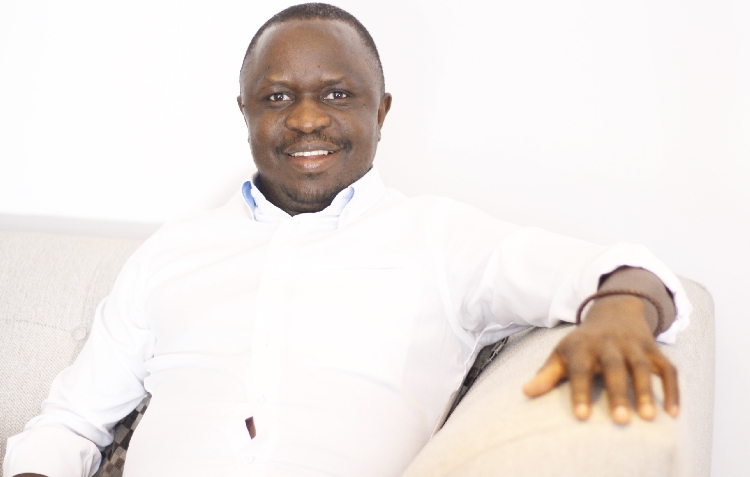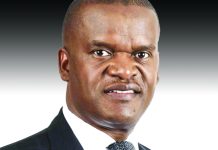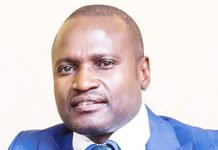
By Shinovene Immanuel and Tileni Mongudhi | 9 December 2016
BUSINESSMAN Vaino Nghipondoka is Namibia’s tender king. Originally a correctional services officer, he now presides over a business empire based on state contracts worth billions of dollars, which he has built up in less than 10 years.
Nghipondoka was recently in the news as a central figure in the row over the government’s failed N$4 billion oil deal with Angola, as one of the connected businessmen who stood to cash in on it.
He has profited handsomely from partnerships with international companies that are targeting state contracts: in the past three years, his company Babyface Civils has been linked to contracts worth N$8 billion. He is believed to lobby for business at the highest levels of government.
There has been intense speculation about his relationship with the head of the Tender Board of Namibia, Ericah Shafudah, who is also the permanent secretary for the Ministry of Finance. He is also one of the businessmen who were once clustered around President Hage Geingob, and were known as the ‘A-Team’.
He is connected to Swapo’s Oshikoto regional coordinator Armas Amukwiyu, a rising star in Swapo after he lent support to Geingob’s march to State House at the 2012 Swapo elective congress.
Nghipondoka allegedly bankrolled Amukwiyu’s flashy lifestyle before appointing him to the boards of his companies, Profile Investments and Profile Investment Holdings, last year.
Nghipondoka’s largesse is understood to have included a top-of-the-range Mercedes-Benz CLS and a Land Rover Sports Utility Vehicle.
There are claims that he financed the purchase of a farm for Amukwiyu this year.
He has also done a farm land transaction with George Simataa, the then permanent secretary in the ministry of works, an institution through which he got a lot of his public works tenders.
TAKE-OFF
Up until 2012, when he had a public spat with the ministry of works over a cancelled N$62 million rail supply contract, Nghipondoka was operating almost invisibly.
In some aspects, Nghipondoka, who is in his early forties, is a self-made man. He is the third of nine siblings, and hails from rural Okalongo in northern Namibia. His first job was as a correctional services officer in Windhoek. But he also started to equip himself for the business world, pursuing a diploma in business administration at the Polytechnic of Namibia (now NUST).
He then worked for two years in the security division of Namdeb. His business interests now range from retailing hardware and building materials, to cattle farming, information technology, property, security and surveillance, debt collection, construction, accounting services and car rentals.
His networking skills came to the fore with the launch of Profile Investments in 2009, roping in business leaders such as Namibia Chamber of Commerce and Industry chief executive officer Tarah Shaanika, former Namport chairperson Jerry Muadinohamba, and the government’s favoured rail contractor and former Swapo central committee member, John Walenga.
A year later, he bought his partners out for a nominal amount. Walenga confirmed that he transferred his shares to Nghipondoka for free and later resigned, while Shaanika said he was a director, but also distanced himself from the company because it never operated.
In 2010, Shafudah was promoted to permanent secretary of the finance ministry, automatically making her chairperson of the Tender Board of Namibia. From that point, Profile Investments and Babyface Civils entered the state contracting game at the highest level.
Many of Nghipondoka’s competitors have accused the tender board of favouring him.
In an interview, he strongly denied the speculation that he has a family or romantic connection to Shafudah.
“She was my classmate at the Polytechnic of Namibia. She is an old woman. How can Shafudah be my girlfriend? Come on!” he countered.
Shafudah said she neither had a connection nor a relationship with Nghipondoka. “It should be put on record that offices, ministries, and agencies prepare specifications and evaluate tenders themselves for consideration by the tender board, not the chairperson. Allegations pointed at me are rubbish,” she said.
Nghipondoka formed part of Geingob’s circle of close business friends, and was among those who accompanied him, when he was still Prime Minister, on the controversial 2014 trip to the soccer World Cup final in Brazil.
“The President is my friend, but I have never used his name,” Nghipondoka said. “The President will always tell us ‘guys, do business and pay tax.’ He won’t say, do business and give me something”.
Over the past 18 months, Nghipondoka was seen as becoming exceptionally close to Swapo power broker Amukwiyu. It was reported that Geingob considered appointing Amukwiyu as acting Swapo vice-president after Pohamba stepped down as party president in April last year.
Amukwiyu was appointed to the boards of Profile Investments in January last year and its holding company, Profile Investment Holdings, a month later. Nghipondoka’s favoured operating style is to act as an intermediary between the government and multinational companies seeking state contracts.
His companies are involved in the construction of houses at the controversial Neckartal Dam project, which has been dogged by allegations that they used their influence to favour certain contractors; the oil storage facility; the harbour expansion project; and the supply of rails to the ministry of works.
The Namibian reported last year that a meeting was held at Nghipondoka’s farm where the reshuffling of permanent secretaries was discussed, and that both he and Amukwiyu attended that meeting.
He denied the allegations that he had pushed for the appointment of permanent secretaries. Nghipondoka said jealousy over his success was driving accusations that he was a middleman.
“We all do the same,” he said. “You go into a joint venture, and the Chinese will do the majority of the project. People only complain because it is Vaino,” he stated.
He is unapologetic about his expensive set of wheels. “I own a N$6 million Ferrari; it was always my dream to buy the car of my choice,” Nghipondoka said. (Also see page 6 & 7 for an in-depth interview)
THE CONTRACTS
In addition to winning his own state tenders, Nghipondoka has partnered with a number of multinational companies which have won government contracts for major infrastructural projects in Namibia.
The state contracts to which he or his companies have been linked include:
• A contract for the installation of a fuel storage facility at Walvis Bay, awarded to a consortium of China Harbour Construction Engineering Company (CHEC), the state-owned Roads Contractor Company and Babyface Civils in 2014. Originally estimated at N$920 million, the cost of of the project had escalated steeply to N$5,5 billion by this year.
• An N$80 million subcontract to provide staff housing at the Neckartal Dam in southern Namibia, part of a N$4 billion job awarded in 2013 to Italian company Salini SpA;
•A N$160 million contract to construct the headquarters of the Directorate of Civil Aviation in Windhoek, won by Babyface Civils in 2014;
• A N$62 million contract to upgrade the Aus-Lüderitz railway line in southern Namibia in 2013, awarded to a joint venture between Nghipondoka’s Profile Investments and VAE South Africa;
• A N$200 million technology tender for the finance ministry’s internet tax reforms awarded to Nghipondoka’s Profile Investments and Chinese partners CA-China SS Software Technology.
• In 2015, the Namibia Students Financial Assistance Fund (NSFAF) appointed a South African company, New Integrated Credit Solutions, and its Namibian partner, Tribesmen Investment – a Nghipondoka company – to collect unpaid student debts amounting to some N$1,5 billion. According to Nghipondoka, they are set to land 10% of the total payment for this work, estimated at about N$400 million.
In 2016, Nghipondoka’s Babyface Civils also won the tender to construct office buildings for the University of Namibia for N$340 million, and also won another contract to build Unam’s southern campus for N$84 million.
• He is linked to Jeovani Properties, which won numerous state contracts, including the extension of the fisheries ministry’s head office in Windhoek for an estimated N$60 million. The exact nature of his interest in Jeovani is unclear, but he said of the company: “Those are my boys. They are doing well.”
• Nghipondoka was also one of a group of Namibians who formed a consortium with state-owned China Jiangxi called Atari CJIC, which grabbed a 12-hectare plot worth N$146 million behind the Maerua Shopping Mall in Windhoek. The contract was aborted after government found the contract had been “erroneously” offered. The consortium was paid N$22 million in an out-of-court settlement.
* This story was produced by The Namibian’s investigative unit in association with the AmaBhungane Centre for Investigative Journalism, an independent non-profit company in South Africa. Tileni Monghudi wrote this story while at The Namibian newspaper, before he was appointed as deputy editor at The Southern Times.






zakup leków online Biofarma Cham no se requiere receta para comprar medicamentos en Ciudad de
México
купить душевую кабину 90х90 недорого в москве с крышей билет москва нижний новгород ласточка цена билета магнит косметик текстильщики москва консульство
грузии в москве официальный сайт запись
It’s hard to come by well-informed people in this particular topic, however, you seem like you know what you’re talking about! Thanks